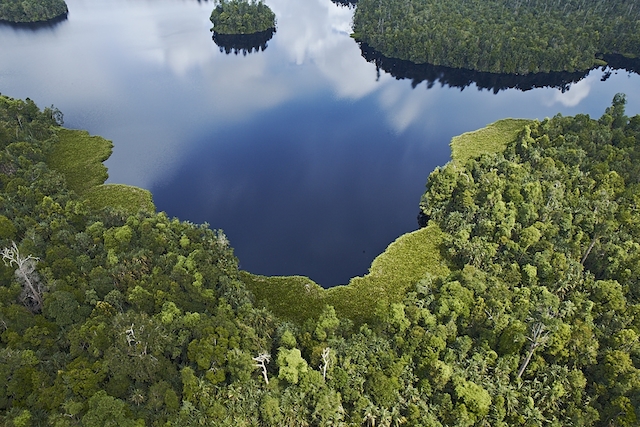The facts behind APRIL’s Sustainable Forest Management Policy
Forestry is an emotional topic. We’ve been reminded of that since APRIL announced its Sustainable Forest Management Policy on 28 January www.aprilasia.com.

APRIL’s Sustainable Forest Management Policy commits the company to protecting forest with High Conservation Value. Under the Policy, APRIL has conserved more than 250,000 hectares of prime forest.
Influential supporters from Indonesia’s Forestry Minister to the conservationist have welcomed the policy. But a few critics loudly opposed to natural resources development have criticized it. That was to be expected. We’ve heard their complaints before.
Unfortunately some of those opponents are purposefully confusing the issue to undermine policies supporting Indonesia’s production forest industry.
Our policy is clear on these points:
- Sustainable Forest Management is the guiding principle for APRIL and all of its fibre suppliers’ operations. APRIL renews degraded forests to improve productivity of the land and preserves High Conservation Value areas to conserve biodiversity, environmental services, and community use.
- APRIL commits to protect, manage, and enhance forest areas with High Conservation Value and High Carbon Stock.
But to eliminate any misunderstanding, here are the facts behind APRIL’s Sustainable Forest Management Policy to dispel deceptions created by critics.
| The fiction | The fact |
| APRIL’s policy is a license to clear natural forest. | Under the policy, APRIL cannot develop forest identified by independent experts as High Conservation Value Forest (HCVF). APRIL establishes renewable plantations in secondary forest areas thereby renewing degraded land. In this way APRIL is reforesting Indonesia’s degraded forests and enhancing land productivity. We conserve more than 250,000 hectares of HCV forest. |
| APRIL will expand land holdings this year for future forest clearance | APRIL and its long-term supply partners will complete the establishment of new plantations by the end of 2014. We have no more plans for establishing additional plantations. |
| The policy doesn’t protect forests in supplier concessions | The policy mandates that all wood suppliers employ APRIL’s HCVF principles in establishing plantations. There is a moratorium (which means no new development) in all concessions where independent HCVF assessments have not been completed, including supplier concessions. |
| The policy has gaps regarding forest preservation and restoration | APRIL commits in the policy to doubling the size of our existing forest restoration program from 20,000 to 40,000 hectares. We conserve more than 250,000 hectares of HCV forest. We also state that we will strive to support conservation areas equal in size to our plantation areas. |
| The 2019 deadline for plantation self-sufficiency can’t be trusted; previous targets were missed | APRIL is 95% done with the establishment of new plantations. Since 2005, APRIL’s policy has been to do HCVF assessment before development or plantation establishment at new concessions. It took time for us to complete plantation establishments. By 2019 all of APRIL’s and its long term supplier concessions will be fully matured plantations. About two-thirds of the wood used in our mill already comes from plantations. APRIL will meet its 2019 target date for relying entirely on plantation wood. |
| APRIL’s policy doesn’t cover sister companies in the RGE Group | The second paragraph of the policy commits APRIL to engage with sister pulp and paper companies to adopt the principles underlying the policy. |
| APRIL’s policy was developed only because its membership in WBCSD is under review | APRIL is always committed to Sustainable Forest Development and one of the major steps was taken in 2005 when we adopted HCVF principles for development of new concessions. The Sustainable Forest Management Policy was months in preparation, starting long before the World Business Council for Sustainable Development (WBCSD) commenced a review of APRIL’s membership. |
| APRIL’s policy falls far short of its competitor APP | The APRIL policy is stronger. It is based on HCV assessments that began in 2005. APP began HCV assessments in late 2013 after nearly all its concessions had been developed. APP will resume operations in new concessions after assessments are completed. APRIL will become entirely reliant on plantation wood in 2019; APP not until 2020. APRIL conserves more than 250,000 hectares of HCV forest and is restoring another 40,000 hectares. APRIL will strive to support conservation areas equal in size to APRIL’s plantation areas. APP’s Forest Conservation Policy makes no mention of conservation area size or restoration. APRIL will not expand its pulp mill until it is entirely reliant on a plantation wood supply. APP puts no limits on mill capacity. APRIL will be monitored by an independent Stakeholder Advisory Committee. APP is monitored by a consultant. |
| APRIL’s restoration project is greenwash | APRIL launched a 10-year, $17 million restoration project in RiauProvince in 2013. It is already producing tangible results including: 1) the production of native species for replanting, 2) improved forest protection from a 32-person Ranger patrol, 3) prevention of illegal logging and burning; 4) auditing and monitoring of endangered plants and animals. |
| In 2012 APRIL planned to clear 60,000 hectares of land | In 2012 APRIL prepared only 6,500 hectares of degraded land for new plantation establishment. |




